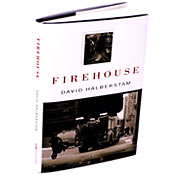
For those many New Yorkers who didn’t happen to know personally someone who died in the World Trade Center disaster, visiting a firehouse was the most common way of bringing the disaster down to human scale. Firemen served the city twice in those days, once by rushing into the towers, and afterward by supplying an example of strength in grief, of living with loss, and of – yes, there’s that word we’ve heard so much – heroism. We studied their photos, learned their nicknames (Tugboat, Buddha), lit candles, left flowers. Which doesn’t mean we understood their pain – but the gestures were important.
David Halberstam is a kind of village elder, arriving on the scene of a national crisis to assess reputations and generally supervise events as they pass into history. This time he didn’t have to travel far. His local firehouse – Engine 40 Ladder 35 at 66th Street and Amsterdam Avenue, near Lincoln Center, the subject of his new book, Firehouse – sent 13 men (altogether, the house has 47) on two trucks down to fight the fire; 12 of them died.
September 11 might appear to be the kind of epic drama for which Halberstam’s trademark heroic adjectives and long-limbed, Homeric prose were designed. But Halberstam the mythmaker is hampered by the fact that mythmaking has been under way for months now.
Halberstam’s firehouse is one in which washing dishes is crucial preparation for facing danger. It’s a place where each man is first among equals, provided with a sufficiency of excellence, but where no one has a swelled head. Bruce Gary, the driver of the engine, was a man who “by dint of his awesome physical strength and equally formidable personal integrity was an imposing figure within the station’s political and social order.” Steve Mercado “was a brilliant mimic.” Vincent Morello’s mechanical skills “had been obvious from the time he was a very young child.”
It becomes hard to make out the real men through the billowing superlatives. Halberstam chronicles some of the hazing and banter, but for the most part this vividly masculine world is denatured. It seems that every high-school sweetheart is married and every marriage is perfect. Pages drift by without a quote. And in Halberstam’s hushed-church atmosphere, there’s little feeling for the surreal particularities of September 11 and the days and weeks that followed – the darkness, the dust and smoke in the air, the spikes of grief, and, for the surviving firemen, the pressure and the bother of being the focus of all that mourning.
A theme that Halberstam flirts with without fully engaging is the gulf between the largely outer-borough working-class culture of the Fire Department and the increasingly wealthy, overwhelmingly white-collar, arguably frivolous culture of Manhattan. It’s the kind of divide that’s produced no shortage of bitterness among the firefighters – toward the city, the department’s leadership, even the tourists. But there’s little space for these inconvenient feelings in Halberstam’s catalogue of virtue.
Only two of the characters seem to deviate from the script. One is April Ginley, the widow of one of the lieutenants, who nursed an inconsolable anger, complaining that her husband hadn’t prepared her for this, and taking issue with the description of the men as heroes. That a widow might feel this way isn’t exactly revelatory, but in context it leaps off the page.
The other is Kevin Shea, the shift’s only survivor, who was found unconscious in the rubble, his neck broken. Shea’s college degree, his high voice, and his sense of whimsy set him apart even before the disaster. “He was just different,” writes Halberstam. And afterward, “his perpetual innocence” made him seem “out of sync with the current mood of the house.”
Shea’s doubts about how he’d performed on that day were the subject of an article by David Grann in The New York Times Magazine. And that magazine’s editor, Adam Moss, is the book’s only villain (Osama bin Laden is not mentioned) for asking the question “Was the firefighter a hero or a coward?” on the cover.
The word coward understandably had explosive consequences in the firehouse, ones it would be very much the point to explore, but Halberstam distills a different kind of lesson. “The incident seemed to underline a cultural conflict in the city itself – between those who always sought to emphasize what was new and exciting and those who abided by more traditional codes, in which there was great sensitivity about adding more pain to existing pain.”
It’s clear which camp Halberstam puts himself in. In Firehouse, he’s put his funeral suit on and come to pay his sincerest respects – which are sincere, and of course the firemen deserve the praise. But there’s also a certain vanity in his self-appointed role as custodian of their memory. And finally, Halberstam is overprotective. Firemen, famously, can take care of themselves.
Firehouse
By David Halberstam
Hyperion; 208 pages; $22.95.